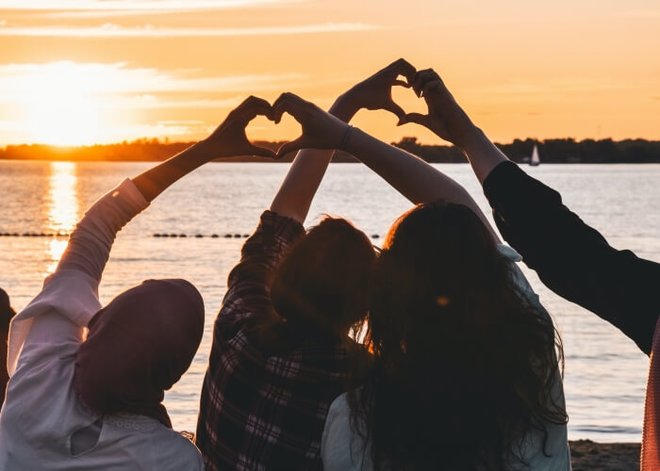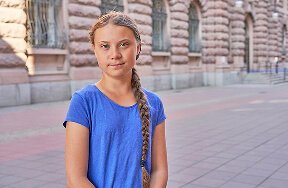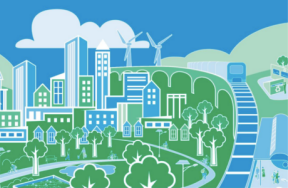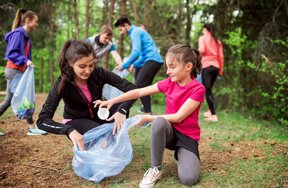You Can Make A Difference - How To Change The World With Aubre Andrus
Discover small acts of healing and kindness that can make a big impact.
Feb 19, 2020Kidzworld chatted with Aubre Andrus, award-winning author of 101 Small Ways to Change the World and The Plastic Problem: 50 Small Ways to Reduce Waste and Help Save the Earth to find out how small actions can make a big impact.
From Greta Thunberg, the Swedish teen who has been nominated for the Nobel Peace Prize for her work to fight climate change, to teens who join peaceful protests like the Women’s March, kids and teens have taken up the battle cry to make a difference and save the earth.
Kidzworld: What is the idea behind "101 Small Ways to Change the World?" What are some easy things kids can start doing right now to change the world?
- Aubre Andrus: 101 Small Ways to Change the World is all about kindness -- kindness to others, kindness to the planet, and kindness to yourself 31680! When we are more intentional with our actions (which means that we do something on purpose and with purpose), we can really make a difference. That's one of the easiest ways kids can change the world right now: spread kindness!
- Stand up for someone who is being bullied 30896, invite someone who is lonely to play, offer to help your caregivers do some chores around the house, teach your sibling how to do something new, and don't forget to be kind to yourself, too. That means thinking positively and giving yourself a break when you mess up. There's always tomorrow!
 When you have a choice to make, always choose kindnessCourtesy of Noorulabdeen Ahmad via Unsplash
When you have a choice to make, always choose kindnessCourtesy of Noorulabdeen Ahmad via Unsplash
What is the idea behind your upcoming book The Plastic Problem? What IS the plastic problem facing us today? How can kids make a difference?
- Aubre: The original title for The Plastic Problem was Planet Plastic -- because our planet is FILLED with plastic! Plastic used to be a really cool invention because things could be made cheaply and quickly like toys, jewelry, furniture, phones, and more. Plastic is very convenient, especially single-use plastic like straws, cups, lids, plates, and silverware. But we rely on that convenience too much these days. And we aren't good at recycling plastic. It's confusing which plastic can be recycled and which can't, and it can be expensive to recycle plastic. That means a lot of plastic ends up in landfills (garbage dumps), where it will sit for 500 years or more. Does it make sense that a plastic bag that gets used for 15 minutes ends up in a landfill for 500 years? It's just not smart. We can come up with a better idea.
Kidzworld: Making a difference is a really broad topic — there are so many things in the world that need change… where should kids start? How can kids turn an interest, a passion, a school assignment or just free time into an opportunity to make a difference?
- Aubre: I think it's important to start with yourself. Think about a topic that's important to you. For example, saving the planet might be important to you but what steps are you taking at home on a daily basis to help be more kind to Mother Earth? Educate yourself by asking a parent or teacher to help you research the things you care about and learn more about what you can do yourself at home. Then, can you convince your family and your friends to make some changes with you? Making a difference really does happen one person at a time.
 Standing up for what you believe in has never been easier! Join a movementCourtesy of Lucia via Unsplash
Standing up for what you believe in has never been easier! Join a movementCourtesy of Lucia via Unsplash
Kidzworld: What are some things kids should keep in mind when picking a passion project or embarking on a new challenge?
- Aubre: The most important thing you can do is talk about the things that are important to you with other people, and get them excited about it. That could be through writing a song, giving a speech at school, creating a painting, or building a website filled with information. Do your best to teach everyone why this issue is important and show them how they can make a difference too. Not everyone will make changes right away (people are stubborn!), but you've still made a difference by opening their mind. You're making a difference every time you show your passion.
 Just like these kindness rocks, little gestures add up to create something big and beautifulCourtesy of Simon Ray via Unsplash
Just like these kindness rocks, little gestures add up to create something big and beautifulCourtesy of Simon Ray via Unsplash
Kidzworld: How can kids make a difference in their school? In their community? In an area of interest like helping other kids, helping animals, the environment, local or national politics, or the elderly?
- Aubre: In 101 Small Ways to Change the World, there are a ton of ideas that cover all of these topics. One of the easiest ways to make a difference is to simply write a thank you card to those who are already making a difference. That could be a librarian that helps the kids at your school find the best books, a local animal shelter that cares for lost and surrendered pets in your neighborhood, or a local organization that helps clean up your local river or ocean. These people should get a pat on the back for doing great work! It will encourage them to keep going and inspire others (like you!) to join their cause.
Kidzworld: Where are some places kids can look to for inspiration if they want to spark change?
- Aubre: Scientists, engineers, and entrepreneurs are always dreaming up amazing ideas that can change the world. They identify a problem and then come up with a creative way to solve it. That's it! Someone had to dream up creative solutions like cars, umbrellas, headphones, folders, lunch trays, garbage trucks, recycling bins, pencil sharpeners, and more. What problem do you see in your community? And what are some creative ways you can solve that problem? What are some things that people have never tried before? No one looks at the world the same way you do. No idea is a bad idea!
 Inspiration is everywhere... if you look for the signs, they will appearCourtesy of Clark via Unsplash
Inspiration is everywhere... if you look for the signs, they will appearCourtesy of Clark via Unsplash
Kidzworld: How has your work writing and researching these books changed your everyday behavior and outlook?
- Aubre: While writing The Plastic Problem, I realized how much garbage I make every day. It's a lot! And I'm trying my best to reduce that amount. I've completely changed my shopping habits to avoid plastic, and that includes plastic packaging. For example, I'm using fabric napkins and fabric towels instead of paper towels, which come wrapped in plastic. I have reusable silicon bags (instead of plastic ones) to store snacks and leftovers. I'm more likely to buy apples and oranges for snacks instead of a box of crackers that come wrapped in plastic. I won't order takeout food from restaurants that are still using tons of plastic bags and Styrofoam. This is called "pre-cycling" and it means that you make a decision about whether or not you should buy something based on how much of it can be recycled. If it can't be recycled, then maybe you shouldn't buy it!
Join The Conversation
What are some ways you make a difference in your community? Share your thoughts in the comments below.

































